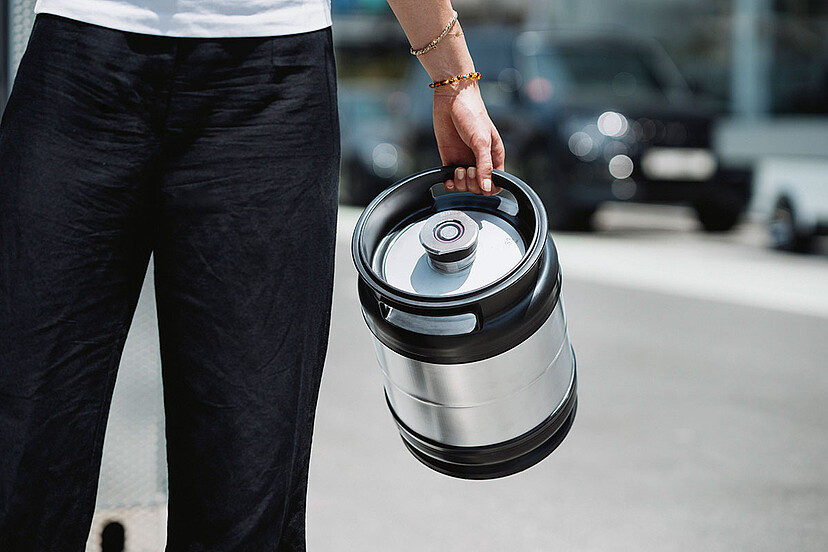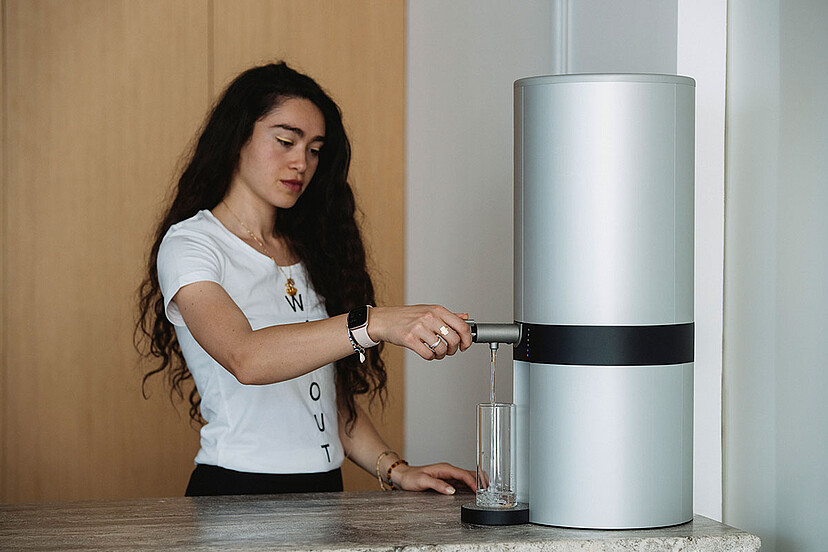Press
Neunkirchen, 30. November 2023. Water from disposable bottles consumes two thousand times more energy than tap water. Every day, 1.4 billion plastic bottles are transported and sold around the world, with a recycling rate of less than ten percent. Swedish high-tech startup Wayout aims to empower hotels, restaurants, schools, hospitals and eventually entire communities to produce their own fresh mineral water on site. Now, a decentralised water treatment plant has been commissioned in Madagaskar. The microfactory is powered by solar energy, reducing the water treatment's eco-footprint to zero. The mineralised drinking water is distributed via robust reusable stainless steel kegs from SCHÄFER Container Systems.
Wayout's solar-powered microfactories treat water from any source, including seawater. The purified water is mineralised – the amount of trace elements it contains is ideal for taste, according to the company – and distributed in reusable stainless steel kegs. The kegs and microfactories are digitally connected in independent proprietary networks, whose data are used to ensure water quality and optimise the distribution cycle.
The turnkey plants can be quickly installed and commissioned in most places in the world. One micro plant treats up to 20,000 liters of water per day, enough to meet the daily drinking and cooking water needs of an average of 3,000 people.
"Our engineers have designed the system to function for at least 30 years. This also corresponds to the average service life of the stainless steel kegs used, which we have integrated into a recirculation system. As a privately owned company, we market the drinking water solutions through leasing contracts including services," explains Ulf Stenerhag, founder and CEO of Wayout.
SCHÄFER Container Systems supplied 250 slimline 10-liter Eco Junior kegsfor the project in Madagascar. The small kegs are filled in the micro plant, brought to the installed water dispensers and placed on them. A mechanical and a digital key unlock the keg, which ensures tamper-resistance. In addition, a mechanical seal ensures hermetic sealing, thus ruling out the possibility of subsequent water contamination. Each keg is uniquely digitally identifiable from the factory via near field communication (NFC). The keg’s unique digital identifier reaches the Wayout-platform in the cloud in real time. In addition, volume, temperature, and time can be read out via a sensor.
Data analysis in the cloud allows the optimisation of logistics. At any given time, the location and usage is known. Empty kegs can thus be replaced in good time and returned to the microfactory. The drum cleaning unit disinfects the inside of the kegs without chemicals using ozone before refilling. The O3 molecule consists of three oxygen atoms and decomposes into oxygen, a natural component of water (H2O).
Reusable kegs are a decisive competitive advantage in the beverage industry due to their practical benefits and economic as well as ecological advantages. Compared to disposable containers, stainless steel kegs save harmful emissions, with around 400,000 tons of greenhouse gases already saved in the USA. This is equivalent to around 500,000 tons of plastic packaging. Considering that PET bottles already take 450 years to decompose even under the influence of UV radiation, is staggering.
"From our point of view, Wayout is the start of a desirable revolution in sustainable drinking water treatment and distribution of mineralised water. We are very pleased that we can play a part in this and that our proven kegs with NFC technology will be used as distribution enablers," says Guido Klinkhammer, CEO at SCHÄFER Container Systems.

